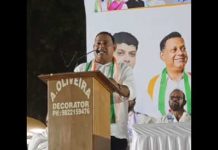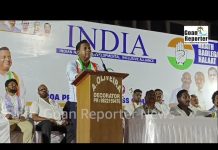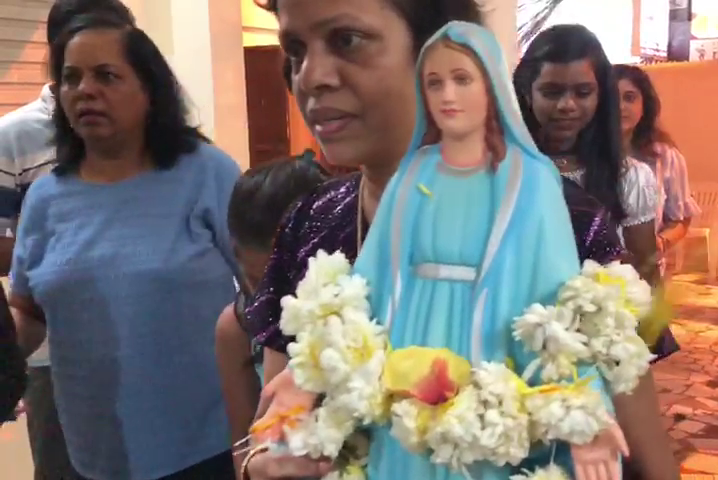Panaji: August 14, 2016 …. August 15, 1947 marked the end of India’s struggle for freedom. The leaders who assumed authority and responsibility for guiding the destinies of independent India were fully aware that political independence was not an end in itself but a necessary condition and means of building up a new India by consolidating the New found national unity, by erecting the political and constitutional structures of a new nation state and by making freedom meaningful and substantive to the common man in terms of good life, social justice and responsible citizenship and participation in the democratic process of decision making.
It meant that India was to be territorially integrated and the people of India welded into well knit national community by inculcating among them the feeling of oneness and sense of belonging to one another. The task that independence brought was, thus, tremendous and involved the creation of a congenial, political, social, cultural and economic environment for the new nation to grow to its full stature and attain strength and stability and prove worthy of the new independence and freedom she had attained.
A number of challenges were faced by free, India. To end post partition communal clashes was the primary task of the Government, secondly the integration of India States was the need of the hour. Sardar Vallabhai Patel skillfully and firmly dealt with the princely states and brought about their integration with India.
The integration of all India States with the exception of Hyderabad and Kashmir was completed by end of November 1949. Police action restored peace in Hyderabad and become a part of Indian Union. The Maharaja of Kashmir signed the instrument of accession in october1947 and thus paved the way for India’s military action Pondicherry which was under the French rule brought peacefully under Indian union and the Government of India’s military action in December 1961 liberated Goa, Daman and Diu from the Portuguese yoke and thus all the territories become a part of India Union.
In accordance with the provisions of states Reorganization Act of 1936, linguistic states were created and one of the Chief irritants to the cause of national unity and integration was removed. A new constitution for independent India was one of the many heavy burdens which freedom has placed on the shoulders of the leaders of Indian Revolution.
The concern of the founding fathers to maintain and strengthen the new found political unity of India is reflected in the provision they have made for a federal form of state with unitary spirit , a strong centralized structure and with wide powers to the states for the realization of full nationhood and consolidation of freedom progress in the economic field was also of paramount importance.
The establishment of a national planning commission to evolve a plan for the economic development of the country and implementing a series of five-year plans for increasing national production and equitable distribution of the fruits of economic development with a veiw to eradicating poverty and improving the quality of life of the common people. Following an independent foreign policy and establishment of international relations on the basis of recognition of equality of status and respect for one another’s sovereignty between the nations was done in an effective manner.
Now the task head is cutout for mother India with the establishment of Niti Aayog under the Chairmanship of the Prime Minister to streamline the centre-state relations thereby giving more powers to the states is seen in new devolution formula under the 14th finance commission where the states will receive extra funding that ever before speaks of their rise in the federal structure.
Team India needs to move ahead as the challenges of religious communalism, regionalism and linguistic chauvinism were rising their ugly heads from time to time. The economy at present is gaining ground after a quarter of century of economic liberalization and with foreign exchange reserves at an all time high. With several innovative programmes for nearly every section of society in force India’s march on the global path as third largest growing economy with presence in almost all the major countries of the world.
India is one of the major global players in the world today and be it at the United Nations organization, BRICS or any other multilateral forum India’s voice is heard today. Recent strides taking in exporting Brahmos missiles to friendly countries is a step in proving to the world about our rising defense status. The Indigenously built various defence requirements under the make in India Programme along with other innovation programme for youth like skill India, standup India, Startup India to gain employment by even becoming a job given rather than only a job seeker has thrown up immense possibilities of growth in our economy.
Realizing the socialist commitment to various stakeholders to reduce illiteracy , inequality, justice, etc. has also resulted in a spirit of oneness in the nation. The developments in the filed of infrastructure like dams, national highways, hydro electric projects, electric water etc has increased by leaps and bounds which give tremendous impetus to the holistic growth of our nation as we head toward the platinum jubilee of independence in 2022.
The dream of providing a house to each and every house hold as also the creation of smart cities and providing urban amenities in rural areas also offers a lot of promise in all the 684 district of our country.
Finally, Democracy which has been adopted as the ideological foundation of the Government and politics of India, has stood the test of times and the gigantic task of building a welt integrated independent secular state becomes the fundamental ideal. The Gradual and progressive process of evolution is in motion and the acclimatization to social conformity and constitutional conventions and practices will herald in prosperous times for our country.
There is an urgent need to cooperate and agree on a number of problems playing India and find solution to them. Whatever may be the situation, the individual should regulate his social behavior and relations in such a way as to contribute to the building up of human community on the foundations of responsible freedom and citizenship and healthy balance between the rights and duties of the individual.





